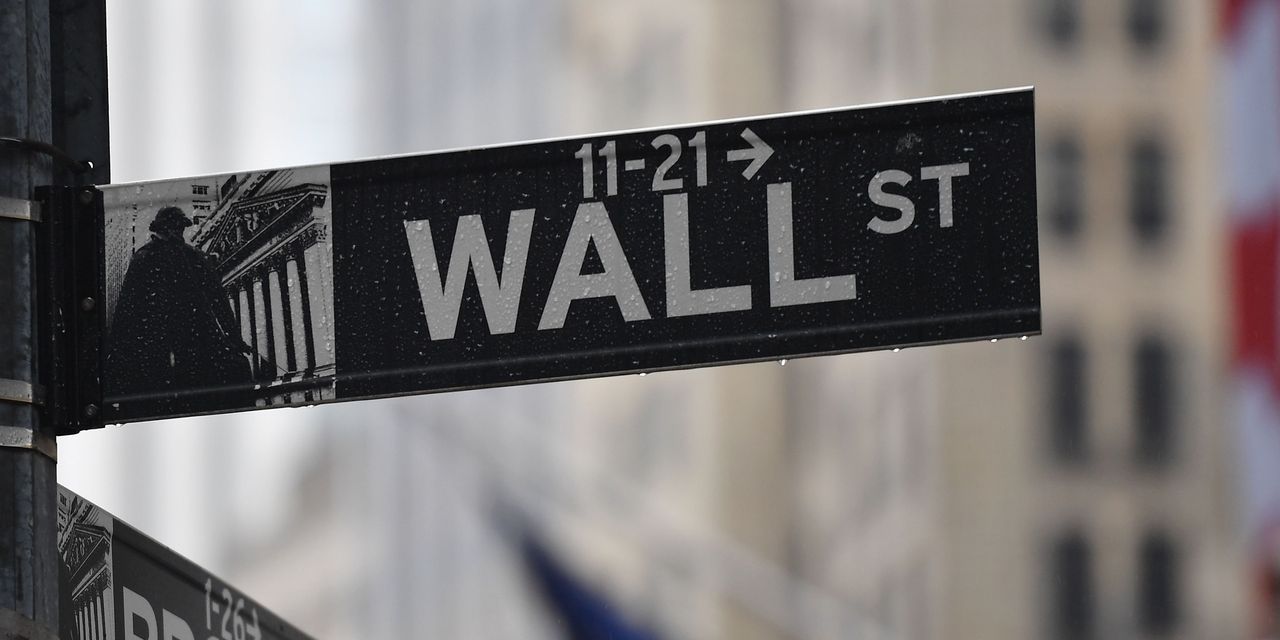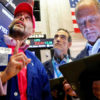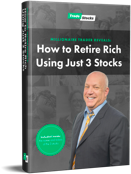
Dow sinks 272 points, but books best November since 1928, and best month since ’87
Stock benchmarks ended lower Monday in the last trading session of November, but equities still managed to log a monthly return for the record books, as progress toward COVID-19 vaccines helped investors look past a scary resurgence of the disease.
What are major benchmarks doing?
- The Dow Jones Industrial Average DJIA, -0.90% fell 271.73 points, or 0.9%, to 29,638.64. The blue-chip index marked its best monthly gain, 11.84%, since January of 1987 and its best November on a percentage basis since 1928.
- The Nasdaq Composite COMP, -0.05% finished down less than 0.1% at 12,198.74. It logged its best monthly gain, up 11.8% in November, since April and its best November since 2001.
- The S&P 500 SPX, -0.46% fell 16.72 points, or 0.5%, to close at 3,621.63, also marking its largest monthly percentage gain, 10.75%, since April and its best April performance since 1928.
- The large-cap Nasdaq-100 index NDX, +0.08% closed 10.10 points, or less than 0.1% higher to reach 12,268.32, registering its best month, up 11%, since April.
- The Russell 2000 index RUT, -1.91% closed down 1.9%, shedding 35.45 points, to reach 1,819.82, but rose 18.3% in November for its best monthly gain on record.
What’s driving the market?
Analysts said stocks took a breather from their strong gains in November.
“Equity investors remained optimistic about the prospect of a vaccine but the upside momentum has clearly slowed as sentiment has become skewed to the upside and traders will likely start to take their cues from the economic data this week as prospects of any additional fiscal stimulus are delayed until next year,” said Boris Schlossberg, managing director at BK Asset Management, in a note.
Some strategists attributed the day’s pullback to profit-taking and positioning heading into the past month of 2020.
“It’s not a complete surprise” there was some rebalancing at the end of the month, said Arnim Holzer, a macro strategist at EAB Investment Group.
Keith Lerner, chief market strategist at SunTrust Advisory Services, a unit of Truist Financial, attributed Monday’s selling to profit-taking after the month’s big run-up and said that stocks may be facing some technical resistance as we head into December.
Read: Why the stock market’s COVID vaccine-inspired rally could soon face a big test
“Also, seeing a little rotation back into technology and health care. That reinforces that today’s action is mainly about profit-taking from recent winners that have gone a long way in a short period of time.” he added.
Indeed, the energy sector soared nearly 30% in November, notching its second-best performance, up nearly 27%, since April, according to Dow Jones Market Data. Financials, meanwhile, rose 16.8% for the second-best performance, behind energy, among the S&P 500’s 11 sectors.
Equities were boosted in November as a trifecta of vaccine candidates saw high efficacy rates in late-stage trials, setting the stage for potential regulatory approval within weeks.
Moderna Inc. MRNA, +20.23% on Monday released final data from its late-stage trial on Monday and said it would apply for emergency-use approval from the Food and Drug Administration. Moderna shares jumped 17%. Pfizer Inc. PFE, +2.90% and BioNTech SE BNTX, +12.95% earlier this month filed for approval for their vaccine candidate.
News reports said Pfizer and BioNTech’s vaccine could receive official approval in the U.K. within the next few days.
“So far, the S&P 500 has not been able to surpass its intraday high of 3645.99 from which was reached on the back of the positive Pfizer/BioNTech vaccine news; this past Friday the S&P 500 reached 3644—close but then it succumbed to selling pressure,” Lerner said.
Market bears contend stocks may have pulled forward gains with the November rally, leaving equities vulnerable to weakness in the weeks ahead. The potential for a rise in COVID-19 infections to accelerate further in the wake of last week’s Thanksgiving Day holiday could also hang over the market, analysts said.
Read: The stock market saw a historic November rally — here’s why that might not bode well for December
Dr. Anthony Fauci, director of the National Institute of Allergy and Infectious Diseases, on Sunday said that the U.S. may see a “surge upon a surge” of the coronavirus in the weeks after Thanksgiving, and that he doesn’t expect current recommendations around social distancing to be relaxed before Christmas.
A delayed but decisive outcome to the Nov. 3 presidential election, which saw Democrat Joe Biden defeat President Donald Trump, was also a source of relief for investors who had feared a muddled outcome that could contribute to political uncertainty. While Trump has continued to dispute the outcome, his efforts to overturn the result have met a series of defeats in the courts.
Biden announced his economic team on Monday, choosing former Federal Reserve Chairwoman Janet Yellen to head the Treasury Department and Neera Tanden to lead the White House’s budget office.
Earlier in the session, markets credited the downbeat final day in November to a report by Reuters late Sunday that the Trump administration was set to add China’s largest chip maker, SMIC, and oil giant CNOOC to its export blacklist, got some blame for pressure.
Meanwhile, in economic reports, the Chicago purchasing managers index ran at 58.2 in November.
A measure of pending home sales fell in October for the second month in a row, signaling the surprisingly strong surge in demand during the pandemic might be ebbing. The index of pending home sales dropped 1.1% in October after a 2.2% decline in September, the National Association of Realtors said Monday.
Which companies are in focus?
- Deal news was also in focus, after information and analytics company IHS Markit Ltd. INFO said it had agreed to be acquired by rival S&P Global Inc. SPGI in an all-stock deal that values IHS at around $44 billion, including $4.8 billion in debt. IHS shares rose 7.4%, while S&P Global shares were up 3%.
- Shares of electric car maker Tesla Inc. TSLA, -3.10% closed down 3.1%, after rising 46% in November, with the company expected to see a plan for its inclusion in the S&P 500 index at the end of Monday’s close.
- DoorDash Inc. disclosed Monday that it has set terms of its initial public offering, in which the app-based food-delivery platform is looking to raise up to $2.81 billion.
- Shares of Nikola NKLA, -26.92% plummeted 27% after it announced a scaled-down deal with General Motors GM, -2.70% that disappointed expectations. GM’s stock finished 2.7% lower.
Which assets are on the move?
The 10-year Treasury note yield TMUBMUSD10Y, 0.844% was up 1.2 basis point to 0.854%.
December gold futures GC00, -0.44% ended down 0.4% at $1,780.90 an ounce, around a five-month low. Crude-oil prices settled lower, with futures for the U.S. benchmark contract CL.1, -1.01% settling 0.4% lower at $45.34 a barrel on the New York Mercantile Exchange.
The greenback was marginally weaker. The ICE U.S. Dollar Index DXY, +0.27%, a gauge of the dollar’s strength against its major rivals, fell 0.2%.
The pan-European Stoxx Europe 600 index SXXP, -0.98% fell 1% and the U.K.’s FTSE 100 UKX, -1.59% closed 1.6% lower.
Japan’s benchmark Nikkei 225 NIK, -0.79% closed down 0.8%. Hong Kong’s Hang Seng HSI, -2.05% dropped 0.5% while the Shanghai Composite SHCOMP, -0.48% lost 0.5%

















